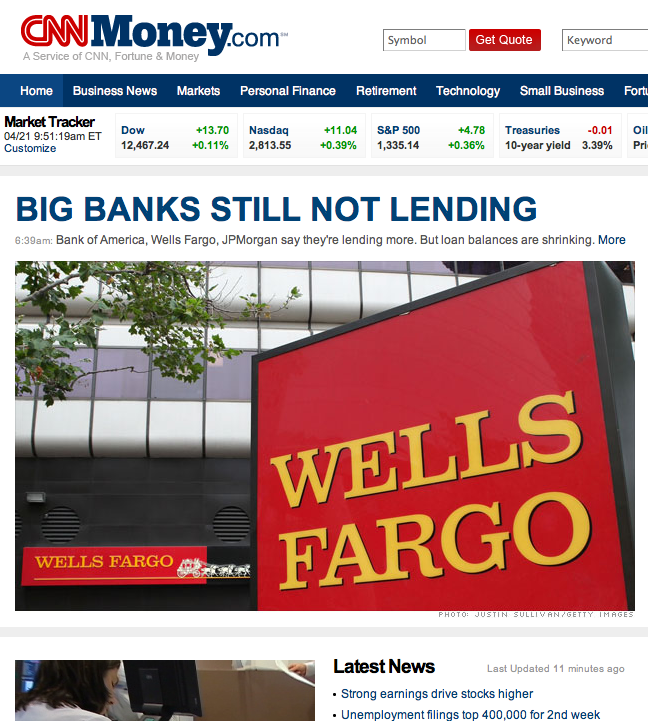Loans
SBA Lending Statistics for Major Programs (as of 9/23/2011)
September 29, 2011This report provides statistics on Year to Date (YTD) SBA Business Loan Approval Activity comparisons for Fiscal Years 2009, 2010, and 2011 for the period ending 09/23/2011.
Funding Floodgates Reopen
September 20, 2011If you’re a business owner, it’s time to get ’em while they’re ~HOT! Small business funding is BACK and more available than they’ve been in years. And guess what? Because we’re just a news site, we’ve got no reason to douse you with a cheesy sales pitch. There’s a lot of money out there right now and that’s the truth.
Merchant Cash Advance (MCA) continues to dominate the alternative financing market but a few new options are changing the landscape. You might call them ‘alternatives to the alternatives’, deals that are based on MCA but have all the bells and whistles of a loan; Fixed time frame, a payment schedule, and even personal guarantees! The underwriting criteria generally requires a set of recent healthy bank statements and semi decent credit credit (yes, your credit still matters) to qualify. Beyond that, it’s up to the individual lender to present their respective checklist of closing documentation. This usually includes some combination of a business property lease, applicant ID card, business permit, and a recent tax return. That’s it. Oh, and the wait time? Expect a week long process if you’re quick on the draw with paperwork.
Two years ago, there wasn’t much variety in the MCA space. Business owners could shop all they wanted but the underwriting and cost structures were essentially identical everywhere. Now there are factor rates that range from from 1.20 to 1.65. It’s more merit based than it used to be. The higher credit rating, stronger cash flow businesses can earn something better than the one-size-fits-all 1.35 factor rate of yesterday. On the same token, the complete credit averse can grab a shot at financing too, but at a steep price.
But there’s more to it than just cost, there’s also the setup:
Don’t want to switch your merchant account?
Stay where you are: There’s a significant chance your merchant processor already has a contract with the MCA provider you’ve chosen. Often times your sales representative may encourage you to open a new merchant account for the lower discount fees and to have a higher degree of control if problems arise. Ultimately, a new merchant account is not essential if you want a MCA.
Leverage your strong cash flow history: If you’ve managed to keep a large positive balance in your bank account for the last few months, your MCA provider could simply extract the agreed percentage from there, rather than directly through the merchant account.
Lock it up: A Lockbox provides the MCA provider with peace of mind by obtaining their payments without the risk of Non-Sufficient Funds from the debit method but also allows you to keep your merchant account. It’s frequently used as a compromise for businesses that are legally prevented from changing their merchant account(i.e. franchisees), but are too cash flow weak to qualify for direct debit payments.
But the buck doesn’t stop at the many ways you can do MCA. You’ve got options!
Merchant Loan: An actual loan based on your credit card sales history. A percentage may still be withheld from each card sale but a periodic or an end-of-term lump sum payment will be applied as needed to ensure the loan is completed within the time frame allotted.
E-Bay/Amazon Loan: Get a loan based on your sales history on Ebay.com or Amazon.com. The largest lender of this type is Kabbage.
Cash flow loans: We described these in the 2nd paragraph. Expect cost ratios from 1.12 to 1.55 and term lengths between 4 and 24 months.
How can you find the floodgates?
You can refer to the directory of direct MCA providers but can check out alternative lenders such On Deck Capital, ForwardLine, Kabbage, and Sure Payment Solutions if you want to diversify your options.
Kennesaw based funding provider, AdvanceMe expects to fund $1 Billion in the next two years. That’s nearly as much as the entire MCA industry did in the last two years combined.
2009 was a year full of “I should’ves” as in “I should’ve obtained financing before the financial crisis.” Cash is finally available to small businesses again and although it is more expensive than it used to be at the local bank, there may never be a time where the process is this quick, approval is this easy, or where your credit score is weighted this lightly. We’re not the salesman here, just the messenger. If there was any project you were remotely considering, now is the time to make a move… Don’t wait until the funding levees have been restored.
– deBanked
https://debanked.com
A Line of Credit and a Term Loan are Different Things
August 24, 2011Posted on July 27, 2011 at 12:22 AM
According to Gary Honig on Lendio.com, business owners sometimes ask for one type of financing but describe another. Get the facts and make sure you get what you need:
A line of credit (LOC) is usually considered a short-term loan. The payments are interest-only, based on the outstanding funds in use.
A term loan is a fixed, funding transaction. It is a one-time loan based on cash flow of the business plus certain collateral pledged against the loan.
When Average Credit is Better Than Excellent Credit: Data Points
August 23, 2011
Back in the wild days of Merchant Cash Advance(MCA), credit score was not only unimportant to the underwriting process, but irrelevant altogether. Business owners with FICO scores reaching down into the 300’s were obtaining 150% of their monthly average processing volume without question. That era came to an end and with good reason. Defaults and losses soared and some funding providers went under. If ignoring credit had continued, it may have lead to the industry’s demise.
In some respects, MCA providers overcompensated by making credit score the only factor, rather than simply incorporating it into the complete underwriting analysis. “FICO Under 500? Declined”, “Less than 550? No thanks!” “Under 600, Don’t bother”. This became the status quo during the conservative years of MCA. And yet business owners with credit scores as high as 800 were ending up in default. After much head scratching, some underwriters began digging a bit deeper. A healthy community burns out all at once in February, an entire industry underperforms, historical cash flow activity predicts survival rate, multiple partner businesses do better than sole proprietorships… While these were just an example of conclusions that could be reached, they’re all potentially part of an underwriting system, a system built on data points. We found a great example on an old personal blog of Jeff Mitelman, the CEO of Canadian based funding source, Advanceit. To quote Jeff,
“Here’s a practical application of using data points:
Merchant A has a restaurant in PEI, below average credit, a maxed out credit card & has applied for a $25,000 advance in June.
Merchant B has a restaurant in Southern Ontario, excellent credit & has applied for $50,000 in January.
With this information alone, B is clearly the better decision.
Now consider this new insight into the transactional history of accounts with similar characteristics that only a knowledge base can provide Advanceit has funded 50 restaurants in PEI, 47 of which have repaid without issue. The two of the 3 that didn’t repay stopped transacting in January. The historical credit card sales of restaurants in PEI peek in July & hit their lowest point in December.
Advanceit has funded 25 restaurants in Southern Ontario, 18 of which have gone to collections, 10 of which had write offs below the funded amount. Of the 10 losses, 8 of them occurred in March. The historical credit card sales of restaurants in Southern Ontario peek in December & hit their lowest point in February.
When evaluating the same two merchants through this lens, A is a no brainer & B is a recipe for disaster.“

A lot of the veteran MCA providers already implement a type of data points system, whether it be an objective scoring model or something more subjective. With the surge of many small ISOs putting their skin in the game and funding their own accounts, this advice should be not overlooked. Without data points, you’re shooting in the dark. Do not forget that your data points need substance either. If the only account funded in the State of Wyoming defaults, that should not be sufficient to cast off all businesses in Wyoming.
Credit is not the only factor, nor is it a solid predictor of the future. It’s a solitary piece of the Merchant Cash Advance puzzle. Don’t believe us? Take it from Jeff, it’s a game of “Learning by Losing.” Do your best.
– The Merchant Cash Advance Resource
http://www.merchantcashadvanceresource.com
Image copyrighted by 123RF
No New SBA Loans Being Accepted. Don’t Understand? We’ll Draw You a Picture
August 23, 2011
On September 27, 2010, the Small Business Administration(SBA) temporarily sweetened the deal on the popular 7(a) loans. As part of the Small Business Jobs Act, government backed default guaranties rose to 90% and many of the major fees were waived.
By late December, the funds for this program had been fully allocated and exhausted. But the announcement was poorly communicated, resulting in thousands of unsuspecting bankers and applicants left stranded and confused. To deal with the drama, the SBA set up queues, where applicants were either placed on standby to take the place of a cancelled Jobs Act loan or to be transitioned into the regular 7(a) loan without the deal sweeteners.
But leave it to the SBA to underestimate the intelligence of their clients. Worried that bankers and business owners might not understand the concept of closing one program and offering them another, they drew a picture.

Actual image being used on SBA.gov to explain the status of Jobs Act loans
In case the phrase “No New Loans Being Accepted” is obscure and cryptic, we can decipher the message using the Daily Transition Phase Alert meter. It’s a state of the art, super genius meter, that was handcrafted by NASA scientists, and topped off with the modern pizazz of a traffic light. Green is GOOD. Red is BAD. Big dollar sign GOOD. Small dollar sign BAD. If the meter is yellow, speed up and try to beat the light but make sure there are no cops behind you first.
Bankers should start using this system en masse. Instead of an outright decline, they can simply inform applicants that their lending ability is in Phase Red. Persistent businesess can take their chances in the underwriting process and battle it out using the Daily Transition Phase Alert meter 2.0. Left foot on $. Right hand on. But watch out for blue because blue is very bad! Blue automatically allows the bank to raise your business checking account fees and increase your credit card processing rates.

The Amazing Daily Transition Phase Alert Meter 2.0!
While your bank is busy playing games with you (they’re not just mind games anymore!), alternative financial firms such as Merchant Cash Advance providers are busy funding applicants in less than 7 days on average. The process is easy, only minimal paperwork is required, it’s credit score flexible, and every business is doing it these days. Want to find out the status of your Merchant Cash Advance application? We’ll hand draw you a picture:

Choose your funding source wisely…
– The Merchant Cash Advance Resource
Upfront Underwriting Fee Scams Still Persist
August 23, 2011
“Based on what you’ve shared, you qualify for a $50,000 loan, so now you just need to send in the application along with a check for $500 to pay for the underwriting.” SCAM!
Many Merchant Cash Advance(MCA) sales reps encounter business owners who have been so defeated by scams, that they are skeptical when something legitimate actually comes along. Some MCA providers may assess fees at the time a deal is funded, but at no point should a business be expected to make a payment prior to that. Think about it: If you are paying just for the opportunity to be considered for a loan, what financial incentive would the lender have to actually make loans? They can simply tell you that you have been declined and walk away with the fee.
The issue does not seem to persist in the MCA industry itself, but rather by con artists pretending to be traditional lenders. According to Dun & Bradstreet:
“Be especially wary of unsolicited phone calls, emails, or letters from prospective lenders making claims that sound too good to be true. If a prospective lender guarantees a loan without checking your credit or reviewing your business plan, proceed with caution. Also beware of lenders who cater to applicants with bad credit, pressure you to make a decision on the spot, and lenders who request payment by Western Union to foreign addresses.” Full article From D&B here.
We’re not looking to scare anyone, but you can never be too careful. Most of the MCA providers in our directory are listed with the Better Business Bureau. When in doubt, check them out!
-The Merchant Cash Advance Resource
Credit Card for Business Owners? Forget it!
August 23, 2011Posted on April 4, 2011 at 9:59 PM
“Anyone that owns a small business is automatically declined,” revealed an inside source at a major credit card issuing bank. A friend of ours that we’ll call Dave (name changed), is an underwriter in charge of approving credit card applications. We were discussing tighter credit standards for consumers, an issue we felt to be of little relevance to business credit, until it got interesting.
According to Dave, and the bank doesn’t make this information public, small business owners and the self-employed are issued automatic declines for cards. “Just to get a simple credit card?”, we asked. Dave explained that their data indicates consumers are less risky than the self-employed. We dug deeper and were told his:
- Employed consumers are more likely to have a fixed budget and steady income.
- Business owners experience continuous ups and downs. During a down, they are more likely to supply their employees with their steady paychecks and skip out on the credit card payment until cash flow improves. If they did it the other way around, they would lose their employees and the business wouldn’t last.
- Employed consumers are better equipped to prove their income since they have verifiable documents such as W-2s or paystubs.
- Business owners are less able to verify their income, more likely to show losses on their tax returns, and less willing disclose their true financial status. Though this may serve them well come tax time, it works against them on credit applications.
But that shouldn’t discourage small business owners from applying. Dave concedes they’ll consider extending credit to businesses open longer than 20 years so long as the applicant has above 720 credit. Ouch!
The Ugly Face of Business Credit Cards
So if you don’t make the cut, or even if you do, credit cards aren’t so attractive these days anyway. The Credit Card Act of 2009 made major changes for consumers but NONE for businesses. In an article by creditcards.com, titled “10 ways business credit cards are different“, is a list of many dangers to look out for. If you’re a business owner, these are the pitfalls:
2009 made major changes for consumers but NONE for businesses. In an article by creditcards.com, titled “10 ways business credit cards are different“, is a list of many dangers to look out for. If you’re a business owner, these are the pitfalls:
- A teaser rate can be as short as 6 months, 3 months, or even 1 day. That attractive 2% rate can be increased on a whim as soon as you sign up or start using the card.
- There is no minimum amount of time to notify you of a payment due. Consumers are required to receive their bill at least 21 days in advance of the payment due date. For business owners, you might not get the bill until the day before!
- Your due date can change every month. Don’t get too comfortable paying on the 30th every month, your card company can switch it up to throw you off and entrap you with late fees.
- There are no late fee penalty limits.
- Payments are applied to the balance with the lowest interest rate first, instead of to the highest interest rate like consumer cards.
- The business owners are usually personally liable for the business card’s debt.
What’s the Alternative?
It’s bad news galore but there’s light at the end of the tunnel. A unique financial product known as a Merchant Cash Advance (MCA) offers all the positive features of a credit card and spits out the negative. Any business that accepts credit/debit card payments from their customers is eligible. Different than a loan, a MCA provider purchases the future card revenues of the business in exchange for a lump sum of cash today. The benefits and differences are truly astounding.
- Good credit is not necessary.
- Funds can be received in under a week. (You can barely get a credit card that quick)
- A business can qualify with as little as 3 months in business.
- The “rate” or the cost of the funds can’t change. Once the cost of funds has been established and executed, it remains the same. The balance does not increase with time nor is there any element of interest.
- Because the balance is only reduced by withholding a percentage of card sales, less funds are withheld in slow periods, and more in strong periods. This tackles the issue of business ups and downs.
- There are usually no personal guarantees.
- Additional funds can be made available before the balance has been reduced to zero.
- Personal income does not need to be verified, just the monthly credit/debit card sales volume.
- Your credit can’t be negatively affected since it is not a loan.
Becoming a First Choice Option
A Merchant Cash Advance is not a last resort method of financing and is quickly becoming a first choice pick in the business world. Certainly better than business credit cards, they also rank better than SBA Loans. [SBA Loan vs. Merchant Cash Advance]
Before you fill out that credit card application, just remember what our friend Dave said. “You’re automatically declined.” Say goodbye to the card issuing naysayers and SBA Loan ploys. The lending system is too far broken to be aggravated about it anymore. If your business needs capital, you can simply sell your future card sales in exchange for cash today. Check out the true direct funding sources in our directory and walk away with flexible financing your business can depend on.
– The Merchant Cash Advance Resource
Banks Still Not Lending But Don’t Take Our Word For it
August 23, 2011Originally published 4/21/11
We’ve preached that banks aren’t lending and we feel confident in that assessment. This was today’s news headline:

According to Fortune, the four largest banks have reduced their loan balances by $210 Billion over the past year. Now about three years out from the height of the financial crisis, capital is becoming harder to access, not easier. “That’s partly because banks must put the worst mistakes of the bubble era in the rearview mirror, by taking losses on bad loans and letting other low-quality portfolios run off. Both those moves lead to lower loans outstanding.” With no tolerance for anything but the highest quality borrowers, business owners have few places to turn.
Now just might be the time to look into a Merchant Cash Advance...
– The Merchant Cash Advance Resource





























